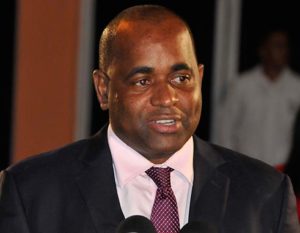In a judgment released Tuesday, the Caribbean Court of Justice (CCJ) dismissed the appeal in the matter of Roosevelt Skerrit & Ors v Antoine Defoe & Ors [2021] CCJ 4 (AJ) (DM) and affirmed the order of the Court of Appeal reinstating the Magistrate’s summonses for the appellants to appear to answer the election charge of treating. Treating refers to directly or indirectly providing food, drink or entertainment to a person, during or after an election with the aim of corruptly influencing that person’s vote. The Court heard the appeal on 10 December 2020.

The case arose out of events leading up to general elections held in Dominica on 8 December 2014. The Dominica Labour Party (“DLP”) led by Mr Roosevelt Skerrit won the majority of the seats in the House of Assembly and so formed the new government.
Shortly before the elections, the DLP held two free public concerts in Roseau. Three members of the United Workers’ Party (“UWP”) who had been defeated at the polls alleged that Mr Skerrit and the other elected DLP members committed the election offence of “treating” contrary to section 56 of the House of Assembly (Elections) Act Cap 2:01 (“the Elections Act”), by hosting those concerts. The UWP members claimed that the aim of the DLP members was to corruptly influence the public to vote for the DLP. The law in Dominica is that a person convicted of treating is disqualified from sitting in the House of Assembly and cannot run for elections for seven years.
The UWP members filed criminal complaints in the Magistrate’s Court and a Magistrate issued summonses against Mr Skerrit and the other elected DLP members who then sought judicial review of the Magistrate’s decision to issue the summonses. They argued that the Magistrate lacked the authority to issue the summonses because the offence of treating concerned the validity of the election, and only the High Court could decide this question. The High Court decided in favour of Mr Skerrit and his colleagues, ruling that the summonses were invalid. The UWP members appealed to the Court of Appeal.
By a majority, the Court of Appeal found in favour of the UWP members. The court decided that the Elections Act created a summary criminal process and gave the Magistrate power to try and convict any person for treating. That power did not intrude on the power of the High Court to rule on questions of the validity of elections and thereby the membership of the House of Assembly.
The members of the DLP appealed the decision of the Court of Appeal. Their counsel argued that the Magistrate was not entitled to issue the summonses or try the alleged offences because only the High Court could determine questions regarding the qualification of persons to sit in the House of Assembly.
The CCJ, in a judgment delivered by the Hon. Mr Justice Anderson, held that summary proceedings for treating were not brought to determine the validity of someone’s membership to the House of Assembly; rather, these proceedings were brought to vindicate the criminal law, or in other words, to try someone accused of committing the offence of treating. According to the Constitution, any person, meaning both persons who were Members of the House and persons who were not, could be the subject of summary proceedings for treating. Therefore, Members of the House were not immune from being prosecuted for that offence. The disqualification which followed if a member is found guilty of treating was not imposed by the Magistrate, rather, it occurred as a matter of law brought about by the operation of section 61 of the Elections Act. Therefore, summary proceedings for treating did not offend the sole power of the High Court to determine questions of membership.
The Hon. Mr Justice Burgess in a concurring judgment found that the appeal should fail because it was not properly before the Court. The Constitution established a system for constitutional redress and interpretation in sections 103 and 104. The appellants were not entitled to raise a question concerning constitutional redress and interpretation by a segue, that is, in a claim for judicial review, as they had attempted to do in this case.
The appeal was therefore dismissed and the summonses and complaints against the Appellants for treating, reinstated.
The Court comprised the Hon. Mr Justice Saunders, President, and the Hon. Mr Justice Jacob Wit, the Hon. Mr Justice Winston Anderson, the Hon. Mme Justice Rajnauth-Lee, the Hon. Mr Justice Barrow, the Hon. Mr Justice Burgess, and the Hon. Mr Justice Jamadar. Mr Anthony Astaphan SC, Mr Lennox Lawrence, Mrs Heather Felix-Evans and Ms Jodie Luke appeared for the appellants. Ms Cara Shillingford and Mr Wayne Marsh appeared for the respondents.










![.[L-R] Parliamentary Representative for Castries Southeast, Lisa Jawahir & Talk show host, Timothy Poleon](https://thevoiceslu.com/wp-content/uploads/2026/02/Lisa-Jawahir-Timothy-Poleon-380x250.jpg)
![Public Service and Utilities Minister Stephenson King delivered remarks [Photo credit: VP]](https://thevoiceslu.com/wp-content/uploads/2026/02/Stephenson-King-380x250.jpg)

